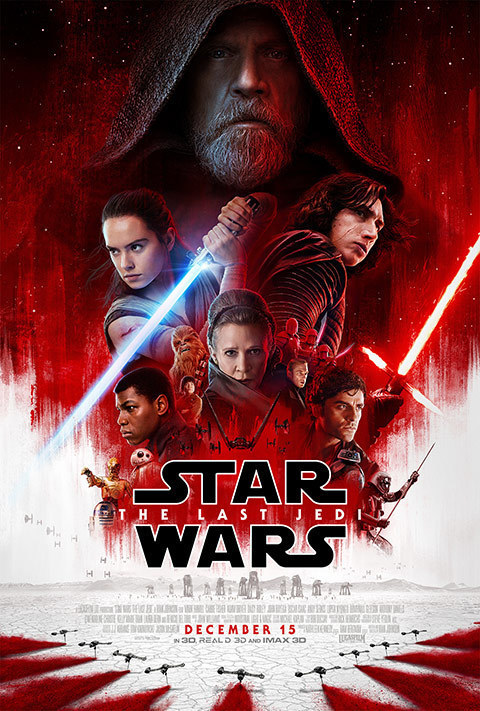
Loved the New Star Wars? Here’s a Jewish, Feminist Angle to Consider
Carrie Fisher is majestic as Leia, holding down the fort at times by sheer force of will—bruised and hurt—but refusing to give up the fight that she’s fought once before. And despite the fact that it’s really cheesy, it is cool to see that Leia’s innate Force abilities allow her to survive being sucked into space, even if she subsequently spends most of the movie in a coma.
The character arc of Rey (Daisy Ridley) started out promisingly in The Force Awakens, where she left behind the lonely deserts of Jakku, discovered her Force powers, and became a hero of the Resistance. In The Last Jedi, however, Rey’s plotline consists first of her badgering Luke Skywalker to come back to the Resistance to help save the galaxy, then trying to convince Kylo Ren (Adam Driver) to turn to the Light Side. Aside from the very visually dynamic sequence where Rey descends into a sinister-looking grotto, hoping to learn more about her parents, and comes face-to-face with herself, Rey’s twinned stories basically have her trying to talk sense into Skywalker men. There surely must be an earlier, scrapped draft of the script that focused on Rey’s affinity for the Dark Side, an affinity that alarms Luke and would be refreshing to see a woman wrestle with on screen. But once Rey decides she needs to save Kylo, that entire storyline is shunted aside and becomes about Kylo’s inner struggle, which we already saw in The Force Awakens. There’s never any question that Rey will join Kylo to rule the galaxy, because while it’s stressed over and over that she apparently could very easily turn evil, we don’t really see evidence of that. While she’s passionate and at times angry, emotions which lead to the Dark Side, it’s all for pretty valid reasons—being repeatedly ignored, dismissed, and lied to isn’t fun, especially by someone you idolize. To Rey’s credit, she moves on from her disappointment with Kylo quickly; off-screen, she steals an escape pod from the First Order and hurries on back to the Millennium Falcon. By the end of the movie, she’s (seemingly) completely given up on turning Kylo back to the Light, and arrives in time to save what remains of the Resistance, having firmly re-established her place with the good guys.
Holdo also suffers from shallow characterization, since she’s basically there to be a foil for Poe while Leia is in a coma. It’s hard not to sympathize with Poe’s frustration towards her, because until she sacrifices herself, we don’t see her have much of a personality, so we have no investment in whether she’s a good guy or secretly an evil one. She’s a pink-haired obstacle who apparently is enough of a strategist and fighter to have earned the rank of Vice-Admiral, and evidently has a deep friendship with Leia that occurs mostly off-screen. As with Rey, again, there has to be a script draft that expanded Holdo’s character and her relationship to the Resistance, and why she treats Resistance fighters like Poe with such flippant nonchalance. And since Holdo dies (in an incredibly well-constructed sequence), she probably won’t even be brought up in Episode IX, making her a mere (stylish) flash in the pan.
Of the all the female characters in The Last Jedi, Rose Tico (Kelly Marie Tran) ultimately has the most fully formed storyline. Much like Diana Prince in this summer’s Wonder Woman, her strength comes her big-heartedness, kindness, and emotional understanding. Rose is a joy and the best part of the movie—her pure goodness and open-hearted attitude are reminiscent of Luke Skywalker’s personality in the original Star Wars movie, making it all the more painful that Luke has since lost his hope. Her mission with Finn (John Boyega) to the fancy glitzy casino planet Canto Bight allows us to learn about her past, and who she sees as the real enemy—not the First Order, but those who profit from war—making her a vivid character with a more nuanced take on the nature of evil than we’ve seen previously.
It is refreshing to have so many women save the day in The Last Jedi. Hopefully, as we continue to see more stories set long ago in a galaxy far, far away, the films will grow beyond seeing women just as saviors and start treating them as complicated characters worth developing fully. Luke tells Rey that the Force belongs to everyone. Perhaps, if the movies make this adjustment, Star Wars will transcend its demographic reputation and become a series for everyone, too.
Deborah Krieger is an arts writer and curatorial assistant based in Philadelphia. She has written for BUST, Popmatters, the Awl, Jewish Currents, and other publications. Find her @debonthearts (Twitter and Instagram)
The views and opinions expressed in this article are the author’s own and do not necessarily reflect those of Lilith Magazine.



